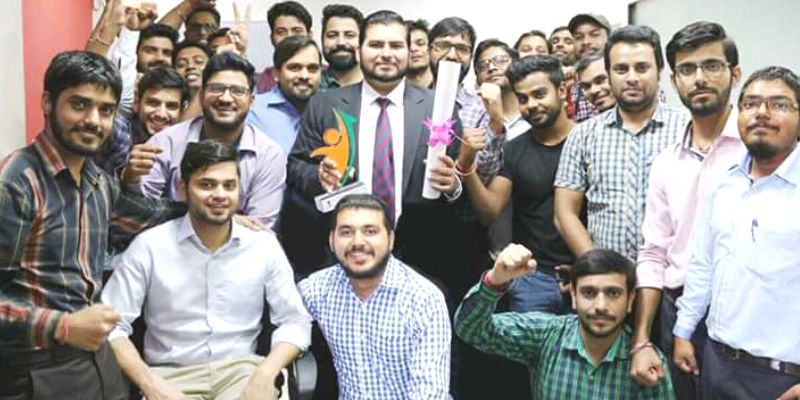Simulanis leverages AR and VR tech to upskill employees across industries
Delhi-based startup develops Augmented Reality, Virtual Reality and 3D simulation-oriented gamified content for learning, skilling and training applications across sectors such as pharma, auto, education, and oil and gas.
At a glance
Startup: Simulanis
Founder: Raman Talwar
Year it was founded: 2013
Where is it based: Delhi
The problem it solves: Simulanis develops AR, VR, and 3D simulation-oriented gamified content for educating and skilling employees across industrial sectors
Sector: AR/VR
Funding raised: Pre-series A funded
According to a recent report by International Data Corporation (IDC), global spending on AR/VR is expected to reach $17.8 billion in 2018 - an increase of nearly 95 percent over the $9.1 billion in 2017.
Considering the exponential growth of the space, AR/VR startups like Scapic, Chymera, and other existing players are in a constant endeavour to innovate and offer unique solutions. However, Simulanis is betting on its end-to-end AR/VR offerings across industries to create a niche among other players. The company develops and deploys the gamified content on 3 platforms - VR hardware (Oculus Rift, HTC Vive, and Mobile VR), computers, and mobile.
According to CB Insights, media companies, movie studios and even VCs are looking closely at the AR/VR space. The report said that over $3.4 billion has been pumped into the space so far.
Raman Talwar, the Founder of Simulanis, says over 100 businesses have worked with Simulanis with close to 100 percent repeat clientele and some of their prominent clients include GSK, HCL, Honeywell, Mahindra, Carrier Midea, and others.
“Our customers are primarily in the pharmaceutical manufacturing domain, and we are working with some of the top names in the industry like Dr. Reddy’s, GlaxoSmithKline, Reckitt Benckise, and Johnson & Johnson, among others. In the auto sector, Simulanis is catering to clients like Mahindra, Scheurle, Nicolas, and Kamag, among others. In the oil and gas sector, Simulanis has recently won HPCL’s Startup Programme, which gives them access to data through which the company can build VR training modules for the oil and gas sector,” he says.
Understanding the business model
In the enterprise model, Simulanis sell licenses and subscription packages to clients through three key model approaches - SaaS subscription (Software as a Service), Per User Perpetual (Unlimited access to a single user for the modules), and SaaP (Software as a Product, where one-time license payment is made by large organisation to use Simulanis products). Besides selling software, being an AR-VR company, it also re-sells AR-VR hardware (manufactured by companies such as Oculus and HTC) to customers based on their demands, and bundles their content with the hardware to sell an “all-integrated-offering”.

After the delivery of the training-oriented content (VR modules, computer-gamified modules, or mobile-gamified modules), Simulanis charges separately for assessment modules (linked to content) on the three different platforms, VR hardware, computer, and mobile. For very large-scale enterprises, the company also works on a Zero Cost and Savings Model, where it doesn’t charge the companies upfront for products, but instead takes a share in the cost savings achieved through implementation of products.
“Simulanis has everything in-house, be it a team for 3D modelling, animation, development, testing, project management, or sales and growth. The ability to do everything in-house is one of our strongest points,” Raman says.
Since the applications of AR-VR technologies for learning and training are new in the market, the company also launched the Simulanis Excellence Assist (SEA) programme, for handholding and assistance to induct trainees and facilitate their use of AR-VR technologies for the first time.
Simulanis also supports training organisations to launch unique (and country-firsts) VR training centres, and offers software support (through licence sales) and hardware support (through hardware sales and the SEA programme).
The initial days
Simulanis started off as a training and consulting business. During this time, Raman realised that internal training was big problem for clients. Soon, the company diversified into providing gamified learning solutions with PC games as the core offering. When AR and VR started gaining prominence, Raman knew that the platform had found a better way to do what it was meant to.
Raman has done his master’s in chemical engineering from the University of Manchester (UK). He received prestigious accolades from the university and several nominations from the industry during his time in England. Prior to taking the entrepreneurial route, he has worked for companies in the FMCG, Engineering Consultative and Process Design industries.
Simulanis’ USP
“Our product development methodology is simple; we create 3D virtual worlds of industrial shop floors or any other environment for which interactive training modules have to be developed, and gamify the operating procedures through our trademark SCISSOR approach,” Raman says.
The SCISSOR approach includes stages such as data gathering, scripting, development, deployment, and building analytics into the products in a collaborative and integrated manner.
Raman reveals that one of the core USP of Simulanis’ AR-VR and 3D simulation-oriented gamification products is the high degree of interactivity and SCORM compliance, which enables “our application to get integrated with major LMS software easily, thereby facilitating large organisations to implement our products quickly without any downtime”.
Simulanis strongly focuses on continuous innovation, and has developed a unique and innovative Multiplayer VR model, which is being embedded in all its applications. Using this feature, the company claims to cut down costs of corporates by allowing multiple people to get trained - while at different locations - over its proprietary collaborative VR software.
With text-based chat and live voice (VOIP) features enabled, this feature seamlessly recreates a live meeting and training scenario and provides the users a unique and “live” training experience, allowing them to work remotely from different locations across the world. Lastly, to cap off the description of product in detail, Simulanis has built one of the largest libraries of pharmaceutical manufacturing 3D assets (numbering 10,000+) convertible to VR. This gives the company a tremendous head-start over the competition and an unparalleled global advantage.
The journey so far and the road ahead
Over FY 2016-17, Simulanis has raised a total of Rs 1.215 crores of investment from third party angel and institutional investors, followed by the recent pre-Series A fundraise of Rs 2.5 crore from CBA Capital.
“The uniqueness of our fundraising journey so far lies in the fact that nearly all of our funding is completely merit-based; we have won competitions like EDUGILD and others to secure winning prizes,” Raman reveals.
Since inception till last financial year, the company claims to have generated revenue of Rs 2 crore. This financial year, it is eyeing business worth Rs 1.5 crore. In next FY, Simulanis aims to generate more revenue than what has been generated in the entire lifetime of the business.
In terms of the revenue model, the company operates in the B2B space and monetises via licensing and subscription packages of the content that they build.
Going ahead, the company - backed by a 35-member team- is planning to strengthen its focus on products for enterprises rather than custom services.
“The brand, which has been well accepted in industries like pharma, auto, marketing, and the oil and gas industry, is also looking to establish a strong foothold in other domains like defence, security, construction, waste management, and healthcare, among others,” Raman says.











